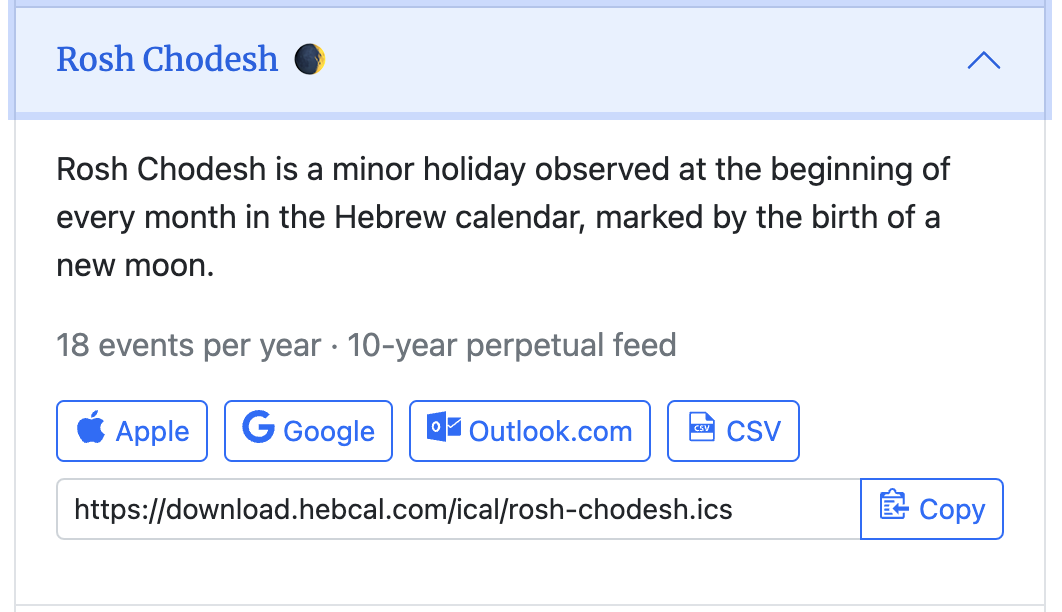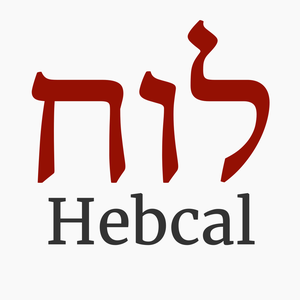Your comments
Thank you for pointing to those sources.
Regrettably, my Hebrew is very weak and I probably won't be able to utilize those sources without some assistance. Would you be willing to prepare a spreadsheet to help out?
If you were able to create something like this (using the example from pages 251-253), this would probably be sufficient to code up a perpetual calendar feed.
| Simple Year | Leap Year | Section | Rules |
| 30 Cheshvan, 29 Adar, 29 Tammuz | 2 Kislev, 11 Adar II, 21 Tammuz | הלכות לשון הרע | 7:7-7:8 |
If I understand the layout of the book correctly, the corresponding pages in Sefaria for those dates above would be these:
Part One, The Prohibition Against Lashon Hara, Principle 7, Seif 7
Part One, The Prohibition Against Lashon Hara, Principle 7, Seif 8
We've posted a slightly longer set of instructions here:
https://www.hebcal.com/home/4435/reinstalling-hebcal-for-apple-watch
Hi, thanks for using Hebcal, and thanks for your message.
We're not quite sure what you mean the "entre and exit of Sabbath are the same".
If you use the Hebcal iCalendar feeds and you specify a location for candle-lighting times, you will see an event called "Candle lighting" on Friday night to indicate the beginning of Shabbat and an event called "Havdalah" on Saturday night to indicate the conclusion of Shabbat. These events are typically approximately 25 hours apart, so they are not at the same time.
You may notice that the aforementioned "Candle lighting" and "Havdalah" calendar events have 0-minute duration. For example, if the start time is at 17:49pm the the end time of that event is also at 17:49pm. Unlike a calendar appointment which might have a 30- or 60-minute duration (which would indicate a range of times), these events deliberately have a 0-minute duration to indicate a moment in time. They are designed to serve as a reminder.
Does this answer your question?
We've done a bit of research here and we aren't clear if there is a standard learning schedule here.
ArtScroll publishes two completely different cycles. There's a 128-day cycle in their Chofetz Chaim: A Daily Companion (Day 1: The Source of Exile, Day 2: Irrefutable Proof, Day 127: Financial Commitments, Day 128: In Closing).
There's an alternate 178-day cycle in ArtScroll's Chofetz Chaim: A Lesson A Day.
Are there other sources of this learning cycle beyond these two offered by ArtScroll? Which do you study?
It's also not yet clear how to link either of these cycles to Sefaria, but of course we agree that any published calendar should ideally link directly to the sources on Sefaria.
Thanks for the feedback and the suggestion! We'll look into the Chofetz Chaim calendar cycle details and will get back to you about the feasibility and timeline.
Hi, thanks for using Hebcal.
If you have questions about Hebrew to Gregorian date conversion, we'd encourage you to use our Hebrew Date Converter page. It's very easy to convert in both directions, and we'd encourage you to experiment with the date conversions so you can get comfortable understanding when the Hebrew date changes.
For example,
Tue, 18 April 2023 after sunset = 28th of Nisan, 5783
https://www.hebcal.com/converter?gd=18&gm=4&gy=2023&gs=on&g2h=1
28th of Nisan, 5783 = Wed, 19 April 2023
https://www.hebcal.com/converter?hd=28&hm=Nisan&hy=5783&h2g=1
Wed, 19 April 2023 = 28th of Nisan, 5783
https://www.hebcal.com/converter?gd=12&gm=3&gy=2023&g2h=1
We hope this helps!
Thanks for using Hebcal and thanks for this excellent product suggestion!
Happy Purim!
Hi, thanks for using the Hebcal Apple Watch app.
We've seen this issue before, and it's a problem because our watch app doesn't have a companion iPhone app. This is a new feature that Apple introduced recently and there are still some bugs with how the user experience works. The long-term fix for us will be to release an iPhone companion app.
In the short term, however, the best workaround we can recommend is to go to the App Store on the watch itself and search for (and install) Hebcal. By installing the app directly on the watch, it seems to work around this error.
We hope this helps!
Customer support service by UserEcho



Great! That would definitely help.
Shabbat shalom!